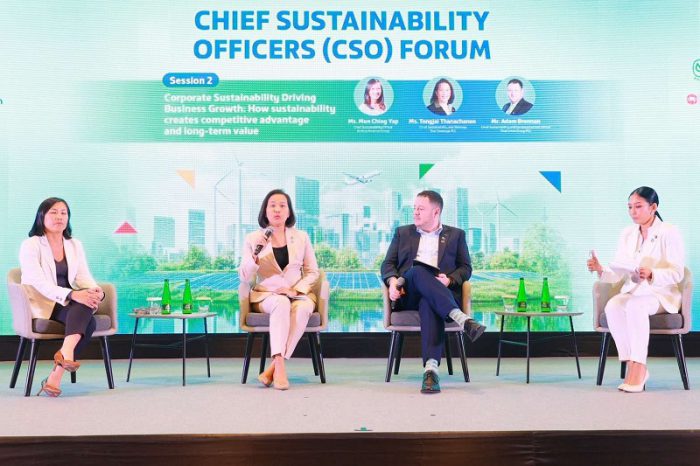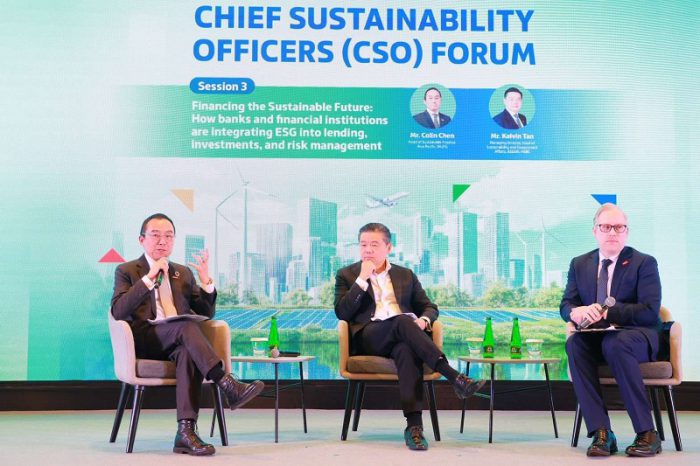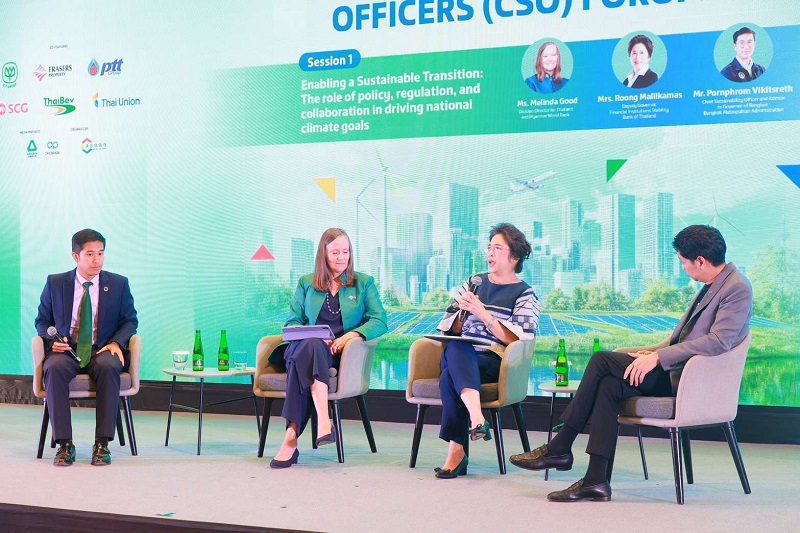Beyond Green: Thai Union and ThaiBev CSOs Detail Sustainability’s role in Business Longevity
“Sustainability, strategy and risk are the three dimensions of the same thing, which is the longevity of business. So, sustainability for us is not only about environmental protection. It’s actually really about survival of the business together with our stakeholders,” said ThaiBev Executive Vice President and Chief Sustainability and Strategy, Tongjai Thanachanan. She highlighted the essence of sustainability in an ever-changing world during the “Sustainability as an Engine for Growth” forum at Sustainability Expo 2025 in Bangkok held at the Queen Sirikit National Convention Centre.

The ThaiBev executive stressed that sustainability initiatives are definitely not additional cost, but actually an integral part of the operations. They are a way to manage risk, and enable them to improve efficiency and cost-competitiveness.
The statement resonated with Bangkok Governor Chadchart Sittipunt’s vision of positioning the city as a marketable brand, leading the Bangkok Metropolitan Administration (BMA) to appoint Pornphrom Vikitsreth as its first Chief Sustainability Officer.
“The governor sees that Bangkok has to fight against other cities in Asia on how to attract people to come, and not only come to travel as a tourist for a short stay, and move somewhere else. But how to attract them to come and live in Bangkok, decided to move themselves, move their families or even as a company to move their regional office. And this is very much linked to sustainability.”
But for Thai seafood supplier Thai Union, it started purely as a cost. “It has evolved since then — that was 10 years ago. Today, we view sustainability very much as a competitive advantage and a key driver of our growth,” said Thai Union Chief Sustainability and Communication Officer, Adam Brennan.

By 2023, Thai Union introduced its “SeaChange 2030” strategy — what Brennan described as the most ambitious and holistic the seafood sector has ever seen. Not only was it designed to address the company’s social and environmental impacts while capturing commercial opportunities, but it was also positioned to meet the needs of multiple stakeholders including NGOs.
“Today, our sustainability program opens doors — doors that were otherwise closed. It allows us to make connections with new retailers that unlock new opportunities for our organization. It also helps us close commercial deals — deals that were on the table for a long, long time, but positioning sustainability as a key differentiator. And it helps us close some of those commercial deals. While protecting people and planet”.
What seemed like just a strategy for improved image a decade ago has now evolved into much more. Thai Union has established itself as trusted supplier for retailers worldwide, at the same time, sharing knowledge and experience with Thai farms and vessels.
“So, in today’s world, we’ve moved from viewing sustainability as brand protection to brand value,” Brennan concluded.
As for Aviation business — often viewed as a nemesis for sustainability — AirAsia CSO Mun Ching Yap admitted that they first had to understand and accept that carbon cost is going to be part of business cost. Managing this cost means understanding various options for carbon abatement. “The biggest one for us would be efficiencies. As a low-cost airline, we have been very strict on efficiency.”
As far as the aviation industry operates, there are limits to what one airline can do on its own. According to Yap, AirAsia has come into conflict with regulators for so many years.
“Regulators would typically look at safety only. But safety and sustainability are not mutually exclusive. With the entire change in international aviation regulation, sustainability is now also a target for regulators”.
Yap said that change became an opportunity for AirAsia to engage regulators in discussions about improving efficiency, especially in airspace management, which would help airlines reduce fuel consumption. “Then you have the option of using new innovations. You may have heard of sustainable aviation fuels — It’s a nice concept in principle, but it comes at a price that most airlines cannot afford.”
Yap added that AirAsia is among several airlines that have invested heavily in operational efficiency. This includes upgrading its fleet and improving pilot flight operations.
As Thailand moves toward a low-carbon future, corporate sustainability leaders share a common vision — collaboration, innovation, accountability, and capacity building will drive the transition from ambition to action. Sustainability is no longer a choice, but a long-term commitment — and the only way forward for everyone to thrive in a changing world.
#SX2025 #SustainabilityExpo2025 #SufficiencyforSustainability #พอเพียงยั่งยืนเพื่อโลก



